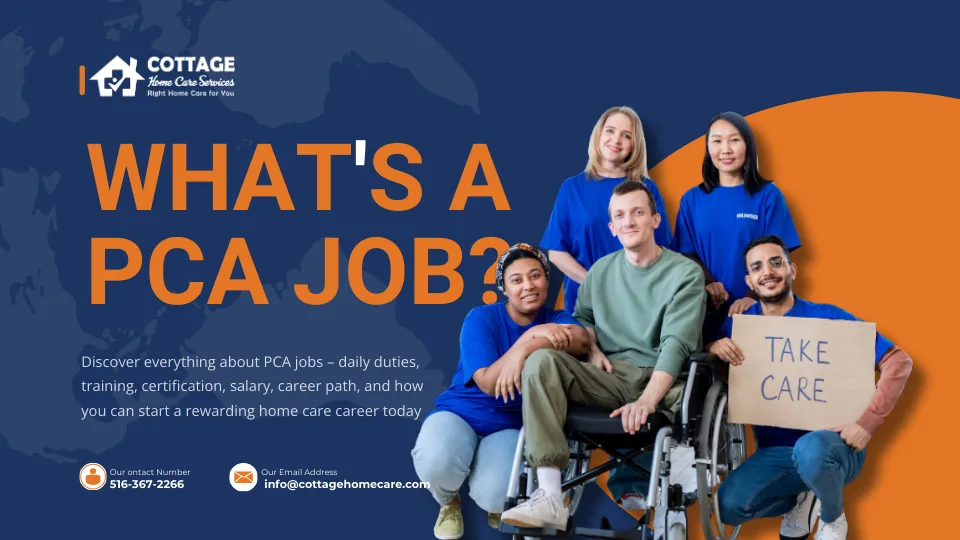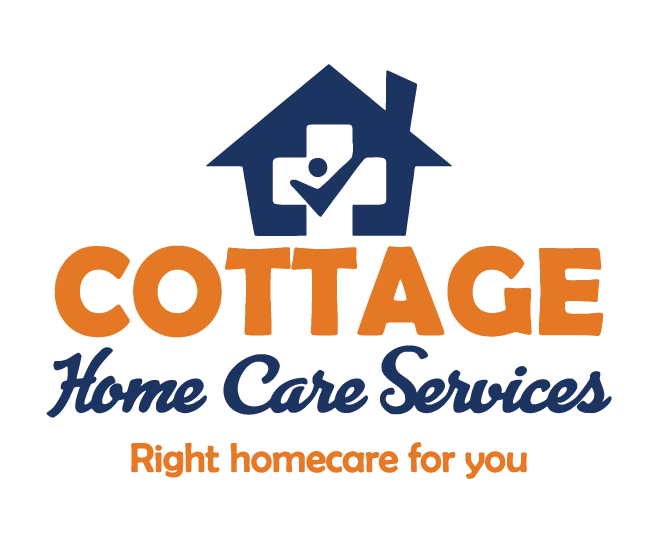
Cottage Care Blog
Whats a PCA Job: Duties, Requirements & Career
By Cottage Home Care Services
0Comment

Learn Whats a PCA Job, Daily Duties, Training, Requirements & Salary
What Does a PCA Job Entail? All the Information You Need
One of the most significant jobs in healthcare and home care is as a PCA. People who require help every day, such as the elderly, disabled, or recovering from illness, can get help from personal care assistants. They aid people with both physical and emotional needs in homes, assisted living facilities, and clinics. If you want to work in caregiving, knowing what a PCA performs might help you understand how gratifying this job can be. As a personal care aide, you can change someone's life while also gaining useful skills.
PCAs are more than just caretakers; they are friends, helpers, and important parts of everyday life. In the US, especially in places like New Jersey,New york, where the number of older people is going up, an increasing number of people want PCA home care services. If you know whats a pca job description and responsibilities are, you can find a career that makes you happy.
Get to Know the Role
A PCA job description explains how personal care assistants help people with everyday tasks. They aid with bathing, grooming, eating, moving around, and doing chores around the house. Most of the time, PCAs work in private homes, nursing homes, and hospitals. Their job is unique and important since they provide both physical treatment and emotional assistance.
The PCA's job includes monitoring the clients' health, reminding them to take their medications, and helping them with exercises or routines. PCAs don't do medical procedures like nurses do, but their care is very important for the safety and comfort of their clients. PCA caregivers are also responsible for keeping clients company, helping them stay active, and letting nurses or family members know about any changes.
Duties
There are many different things that PCAs are responsible for. They aid clients with things like clothing, eating, and personal hygiene. They help with chores around the house, such as cooking, cleaning, and doing laundry. PCAs also make sure that clients take their meds on schedule, stay safe, and have fun with other people. Knowing what a personal care assistant does might help you understand their daily responsibilities.
PCAs do a lot of things, but there are stringent rules about what they can and can't do. PCAs can't provide shots, figure out what's wrong with someone, or do more complicated medical treatments. These guidelines keep you secure and follow state rules. When you compare PCA and CNA differences, you see that CNAs have medical training and PCAs focus on daily care and support activities.
Everyday Chores
The first thing a PCA does in the morning is get their clients ready for the day. They help with meals, bathing, and getting dressed. During the day, PCAs help with movement, manage medications, and give rides when needed. In the afternoon, they help with small chores around the house or encourage the client to engage with others to improve their life.
One of the most important things a PCA does is keep people company. They converse, read, play games, or help with hobbies for a while. This emotional support is just as crucial as taking care of your body. A personal care aide job description stresses the importance of creating trust and good connections with clients, which makes the work both important and fulfilling.
Requirements
The PCA criteria differ from state to state, but they usually include being at least 18 years old, having a clean background check, and being legally allowed to work. Some states demand basic health checks or vaccinations. You need to be physically and emotionally strong to do the job well.
You need to be able to communicate, show empathy, be patient, and pay attention to details. It is important to be able to lift, bend, and help customers securely. PCAs spend a lot of time supporting clients with their personal and emotional needs; therefore, soft skills are just as crucial. Knowing what qualifications a PCA needs helps ensure that people who apply are ready for this hard but rewarding job.
Training and Getting Certified
You will be ready to give safe and effective care after PCA training and certification. Training includes topics such as personal care, cleanliness, basic nutrition, household management, and safety measures. Internships or supervised employment are common ways for students to get hands-on experience in many disciplines. Knowing what PCA education requirements are helps prospective applicants meet the standards for working in home care.
Each state has its own rules about certification. In New Jersey, NJ PCA employment frequently requires you to finish state-approved training and pass a competency test. Getting a PCA certification makes you more credible and opens up more job prospects. Getting certified PCA training can help you get better-paying jobs and more specialized jobs in the healthcare profession.
For HHA Certification, you can check Brooklyn Institute of Vocational Training or learn more here. Contact Number: (929) 386-0092
Payment
The average hourly wage for a PCA in New Jersey is between $14.68 and $17.82, depending on the person's experience, credentials, and the place where they work. Many jobs come with health insurance, paid time off, retirement plans, and overtime compensation. The compensation and advantages of a PCA job make it appealing, especially for people who like flexible hours and meaningful work.
Candidates can also plan for long-term advancement by learning about PCA job openings. Some benefits are training reimbursement, transportation stipends, and performance bonuses. Home care organizations generally offer consistent schedules and the chance to build long-term relationships with clients, which makes the position of personal care assistant beneficial both financially and personally.
Career Path
To become a PCA, you must first complete the prerequisites, go through training, and get certified. After that, working as a PCA in home care helps you learn new skills and offers opportunities for higher-level jobs, such as supervisory or specialized caring duties.
To be a successful PCA, you need to be dedicated, always learning, and able to communicate well. You can do well by following professional growth recommendations, including exploring PCA job opportunities, networking with healthcare professionals, and obtaining additional certifications. This job is quite flexible because many PCAs go on to become CNAs or nurses.
Conclusion: Sign Up for Cottage Home Care Services Right Now
A PCA position gives you a unique chance to make a real difference in people's lives. You can have a rewarding job in home care if you get the right training, certification, and skills. Cottage Home Care Services hires caring Caregiver .CHHA,PCAs all around New Jersey,Newyork.
To get started with your career, email us at info@cottagehomecare.com or call 516-367-2266. Join our team and enjoy the benefits of assisting people every day through NY ,NJ Caregiver, PCA employment and friendly workplaces.
To know About HHA Certification Click
To know About Difference Between CNA and PCA: Complete Guide 2025 Click
Recent Posts
Categories
Related Topic
whats a pca jobPCA job descriptionPCA dutiesPCA trainingPCA certificationPCA requirementsPCA skillsPCA salarypersonal care assistant jobNJ PCA jobsPCA responsibilitiesPCA career pathPCA educationPCA vs CNAPCA home care services
0comments
COMMENT SECTION
